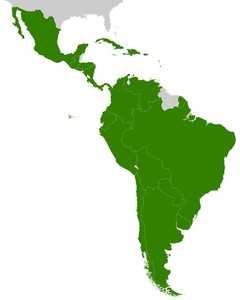According to a study led by Bas (2023), the Latin American (LA) biosimilars market is positioned for substantial growth over the next decades as a cost-effective alternative to expensive patented biomolecules [1].
Latin America's biosimilars market: regulatory, institutional, and technological aspects
Biosimilars/Research
|
Posted 21/11/2023
 0
Post your comment
0
Post your comment

This expansion is propelled by the imperative of accessible health care, rising chronic diseases, imminent biological patent expirations, and the integration of artificial intelligence (AI) technologies.
Notably, Argentina, Brazil, and Mexico have taken significant strides by establishing regulatory frameworks governing biosimilar endorsement and investing in local manufacturing, sales, and distribution. However, amidst this promising landscape, LA confronts challenges rooted in inadequate institutional frameworks and insufficient public policies, hindering the harmonization of biosimilar regulations. A critical facet to consider is the escalating cost associated with the R & D of novel biomolecules, which has kindled a preference for biosimilars. The expiration of patents presents a crucial opportunity for biosimilars to enter the market of cost-effective alternatives. The effectiveness of this hinges upon robust regulations and the institutional frameworks charged with enforcing them across LA. However, variations among LA nations underscore the challenge of harmonization, necessitating concerted efforts to improve both regulatory and institutional quality.
AI's transformative potential is paramount, poised to expedite processes and enhance efficacy across biosimilar R & D phases. However, achieving this requires the adaptation of existing regulations to standardize AI-integrated processes regionally, transcending isolated initiatives in countries like Argentina, Brazil, and Mexico. As these nations exhibit varying capabilities, the alignment of public policies governing biosimilar regulations becomes imperative. The inconsistent institutional quality across these countries poses a significant obstacle to regulatory uniformity. Addressing this shortfall is pivotal in fostering a thriving biosimilar industry that caters to all segments of society.
Furthermore, enhancing the competencies of healthcare professionals in biomolecules development, in the use of AI and ensuring the corresponding infrastructure are essential for realizing the potential of biosimilars. This requires substantial investments from the public and private sectors, as well as consistent governmental policies. AI also plays a crucial role in maintaining quality standards throughout the biosimilar development process.
With population growth and longer lifespans leading to an increase in diseases, the costs associated with biomolecule development are expected to rise. It is imperative to establish consensus on criteria to promote wider biosimilar adoption across LA, thereby mitigating the risk of a substantial portion of the population being denied of quality treatments due to financial constraints.
Although the expiration of numerous patents presents complexities, it holds significant benefits for the biosimilar industry, governments and patients alike. This transition fosters stability in treating complex illnesses like oncological conditions. To harness this potential, conducting a thorough assessment of expiring ‘blockbuster’ patents and their potential as impactful biosimilars is essential. Contrary to stifling innovation, biosimilars play a pivotal role in rendering quality medicines accessible to socioeconomically disadvantaged individuals. Coexisting alongside innovative drugs, they cater to distinct markets and purposes, contributing to the dynamism of the pharmaceutical landscape.
The author concluded that the LA biosimilars market demands the convergence of several factors: the interplay of regulations, institutional quality, affordability, competent human capital, and the strategic integration of AI. Harmonizing regulations across LA to align with international standards holds the potential to expedite approvals and enhance efficacy. The biosimilars landscape offers substantial opportunities for LA, anchored in comprehensive regulatory frameworks, robust institutions, and dynamic technological integration.
Conflict of interest
The authors of the research paper [1] declared that there was no conflict of interest.
Abstracted by Associate Professor Tomas Gabriel Bas, PhD, Universidad Católica de Norte, ECIEM, Coquimbo, Chile.
Editor’s comment
Readers interested to learn more about biosimilars in the Latin American market are invited to visit www.gabi-journal.net to view the following manuscript published in GaBI Journal:
Current trends for biosimilars in the Latin American market
GaBI Journal is indexed in Embase, Scopus, Emerging Sources Citation Index and more.
Readers interested in contributing a research or perspective paper to GaBI Journal – an independent, peer reviewed academic journal – please send us your submission here.
GaBI Journal Citation Impact
2.2 – CiteScore 2021 (calculated on 5 May 2022)
Submit a manuscript to GaBI Journal
Related articles
IBD barriers: an analysis of Latin America
AMLAC: regulatory agency for medicines in Latin America and the Caribbean established
|
LATIN AMERICAN FORUM View the latest headline article: Alianza entre Abbott y mAbxience para los biosimilares en los mercados emergentes Browse the news in the Latin American Forum! Register to receive the GaBI Latin American Forum newsletter. Inform colleagues and friends of this new initiative.
FORO LATINOAMERICANO Ver el último artículo de cabecera: Alianza entre Abbott y mAbxience para los biosimilares en los mercados emergentes !Explore las noticias en el Foro Latinoamericano! Regístrese para recibir el boletín informativo GaBI Foro Latinoamericano. Informe a colegas y amigos sobre esta nueva iniciativa. |
Reference
1. Bas, TG. Biosimilars for the next decade in Latin America: a window of opportunity. Expert Opinion on Biological Therapy, 2023.
https://www.tandfonline.com/doi/full/10.1080/14712598.2023.2245780?needAccess=true
Permission granted to reproduce for personal and non-commercial use only. All other reproduction, copy or reprinting of all or part of any ‘Content’ found on this website is strictly prohibited without the prior consent of the publisher. Contact the publisher to obtain permission before redistributing.
Copyright – Unless otherwise stated all contents of this website are © 2023 Pro Pharma Communications International. All Rights Reserved.
News
FDA approves Poherdy (first interchangeable pertuzumab) and Armlupeg (pegfilgrastim) biosimilars
EMA recommends approval for insulin glargine biosimilar Ondibta and denosumab biosimilar Osqay
General
Samsung Bioepis wins Pyzchiva case; Regeneron patent rulings threaten foreign biosimilars
Chinese biosimilars go global: growth, partnerships, and challenges
What is the future for the US biosimilar interchangeability designation

Biosimilars/Research Posted 05/06/2025
Biosimilar clinical efficacy studies: are they still necessary?

Biosimilars/Research Posted 27/05/2025
The best selling biotechnology drugs of 2008: the next biosimilars targets








Post your comment